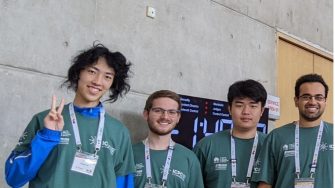CSE students show resilience during ICPC World Finals in Dhaka
A team of three CSE students have placed 41st out of 132 teams in the ICPC World Finals in Dhaka.
A team of three CSE students have placed 41st out of 132 teams in the ICPC World Finals in Dhaka.

The International Collegiate Programming Contest (ICPC) is the most prestigious algorithmic programming contest for university students. Running since 1977, the 45th world finals featured 396 contestants representing 132 universities across 45 nations.
The UNSW team consisted of Computer Science and Engineering undergraduate students Angus Ritossa, Pengsen Mao and Temmie Yao, who qualified for the ICPC World Finals by placing first in the South Pacific Regional Finals in early 2021. Due to the pandemic, the world finals were delayed until late 2022.
ICPC fosters creativity, teamwork, and innovation in building new software programs, and enables students to test their ability to perform under pressure. The contest pits teams of three university students against 12 complex, real-world problems, with a gruelling five-hour deadline. Huddled around a single computer, competitors race against the clock in a battle of logic, strategy and mental endurance.
“Time management is essential, and we needed to work as a team to ensure that time at the computer wasn't wasted. To do this, we all let each other know when we wanted to use the computer, and we would allocate the computer to whatever was the most pressing or would take the least time. I think we handled this and the other teamwork aspects quite well,” said Angus Ritossa.
“Because there is only one computer between three people, it’s important to minimise time spent debugging, so more time is spent planning the code before touching the computer. This has improved my programming ability more generally,” he said.
The problems are extremely challenging, and no team in the world finals was able to solve them all. Angus, Pengsen and Temmie managed to successfully solve five problems.
“We allocated problems to team members based on our algorithm competence, as we had been doing in our training. When one of us got stuck on one problem, the others could continue working on another problem,” said Pengsen Mao.
“The students showed great resilience to solve two problems in the closing stages of the contest,” said Dr Raveen de Silva of UNSW Computer Science and Engineering, who coached the team.
“UNSW continues to lead the South Pacific region in competitive programming, and we consistently perform at a level in keeping with our international standing. Our team placed ahead of the likes of The National University of Singapore, The University of Hong Kong and The University of Melbourne,” he said.